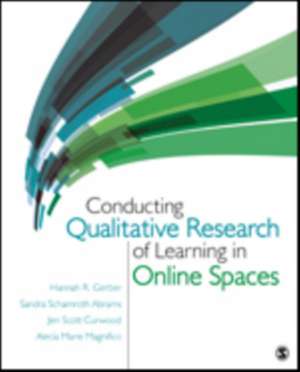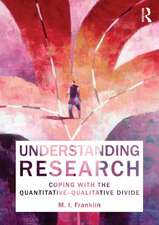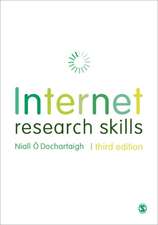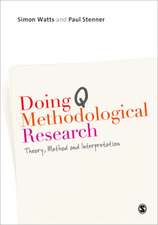Conducting Qualitative Research of Learning in Online Spaces
Autor Hannah R. Gerber, Sandra Schamroth Abrams, Jen Scott Curwood, Alecia Marie Magnificoen Limba Engleză Paperback – 26 mai 2016
Preț: 449.05 lei
Nou
85.93€ • 89.94$ • 71.52£
Carte disponibilă
Livrare economică 10-24 martie
Specificații
ISBN-10: 1483333841
Pagini: 232
Dimensiuni: 187 x 232 x 13 mm
Greutate: 0.41 kg
Ediția:1
Editura: SAGE Publications
Colecția Sage Publications, Inc
Locul publicării:Thousand Oaks, United States
Recenzii
This book helps students not only to understand the complexities of researching online learning but also how they can apply these theoretical perspectives to their own research through its extensive and varied examples of contemporary online research.
This book takes online qualitative research methods to the next level in terms of innovative methods, data collection and analysis, as well as mapping out a more nuanced and useful set of ethical perspectives to guide researcher practice in online spaces.
In a rapidly evolving field, this book stands as valuable point of reference. It offers a lively, thoughtful and critical commentary on learning in online spaces, and challenges readers to do the same. The authors offer an agenda to advance the field further, identifying the foundational issues and approaches to studying these which will shape new work in the years ahead.
In the long history of education, online learning is a recent advancement of pedagogy. Online instructors, researchers, and students have, to-date, simultaneously enacted a range of individualized methods to conduct their work, while seeking a primer on guidelines to follow that does not exist. Finally, they have Conducting Qualitative Research of Learning in Online Spaces to help them organize their efforts, ethics, tools, and definitions and they no longer have to spend valuable research time seeking such standards.
Cuprins
Guiding Questions
Introduction
Mediated Spaces and Online Learning
Making Pragmatic Choices about Methods
Choosing among Qualitative Traditions
Qualitative Approaches
Research Paradigms and Philosophical Stances in a Study's Design
Pragmatic Research and Remix: Considering Multimethod Approaches
Remix
Conclusion
Connecting to Your Work
Chapter 2: What Kinds of Online Spaces Exist?
Guiding Questions
Introduction
Conceptualizing Online Spaces as Field Sites
Defining the Field Site
Understanding Networked Field Sites
Learning in Social Networking Forums
Mapping Networked Field Sites
Conclusion
Connecting to Your Work
Chapter 3: How Do We Conceptualize Learning in Online Spaces?
Guiding Questions
Introduction
Using Learning Theory as a Tool fro Research Design
Complementary and Contradictory Theories of Learning
Theories of Learning
Conclusion
Connecting to Your Work
Chapter 4: What Does It Mean to Be a Qualitative Researcher of Online Spaces?
Guiding Questions
Introduction
Aspects of Researching Online Meaning Making
Conclusion
Connecting to Your Work
Chapter 5: What Methodological Tools Are Available for Data Collection?
Guiding Questions
Introduction
Establishing Trustworthiness
Trustworthiness and Analytic Openness
Data Sources
Conclusion
Connecting to Your Work
Chapter 6: What Tools are Available for Data Analysis?
Guiding Questions
Introduction
Moving from Data Collection to Analysis
Considering Data Analysis in Networked Field Sites
Innovation with Methods
Conclusion
Connecting to Your Work
Chapter 7: What Is Ethical Research?
Guiding Questions
Introduction
Research Ethics and Policies across Multiple Contexts
The Public versus the Private Web
Conclusion
Connecting to Your Work
Chapter 8: How Might Research Change in New Times?
Guiding Questions
Introduction
The Complicated Nature of Studying Learning in Online Spaces
(Re)Imagining Research Techniques
Shifting Cultures, Shifting Boundaries
Conclusion
Connecting to Your Work
Notă biografică
Hannah R. Gerber is an associate professor in the Department of Language, Literacy and Special Populations at Sam Houston State University in Texas, where she teaches graduate courses in digital epistemologies and virtual ethnography. To date, Gerber¿s research has focused on adolescents and their videogaming practices, examining confluences of learning across various literacies in multiple online and offline settings. She has conducted research in diverse environments such as homes, libraries, and schools, and within inner city, rural, and international contexts such as North America, Middle East, and South East Asia. She has given lectures and keynote addresses on her research at conferences and universities around the world. Gerber¿s recent publications can be found in English Journal, Educational Media International, and The ALAN Review. She is co-editor of Bridging Literacies with Videogames.






